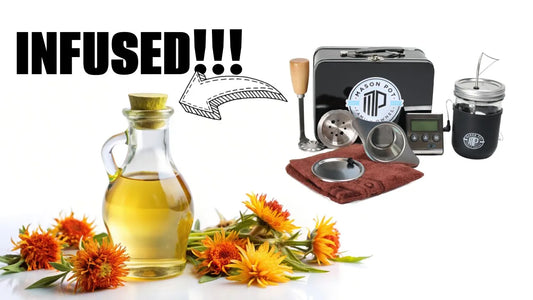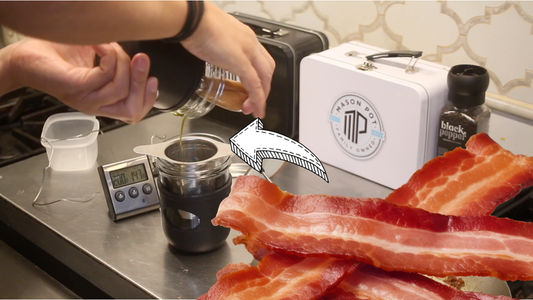Hey Mason Pot fam, it's your bro Jack here, and today we're diving deep into the five most common infusion mistakes I've observed. Whether you're a seasoned infuser or just starting out, these insights will help you refine your technique and achieve better results. Let's get into it!
1. Overcomplicating the Process
The first mistake many newcomers make is overcomplicating the infusion process. I remember my initial attempts; I was constantly questioning if I was doing it right. From decarbing the bud in the oven to infusing it in oil, the process seemed daunting. However, it's crucial to trust the simplicity of the process. Essentially, infusion involves three basic steps:
- Decarbing the flower: This activates the THC by converting THCA into THC through heat.
- Infusing the decarbed flower into a carrier oil or butter: This can be any fat of your choice.
- Straining the mixture: After a few hours of infusion, simply strain out the solids.
Remember, the key is to keep it simple and trust the process. Don't get overwhelmed by the details.
2. Decarbing Incorrectly
Decarbing, also known as activation, is critical for transforming your bud into a potent ingredient for your infusions and edibles. By applying heat, you convert the non-psychoactive THCA into THC, the compound most people are looking for to achieve a high. While some opt for a passive infusion without decarbing, I recommend decarbing about 98-99% of the time to ensure potency.
However, not all decarbing methods are created equal. I started with placing the bud openly on a tray in the oven, then moved to using a jar, and finally to using specialized infusers. For example, with the Mason Pot, you can monitor the exact temperature inside the jar, ensuring perfect decarbing conditions. We recommend decarbing at 240°F for 40 minutes for optimal results.
3. Incorrect Ratios
The potency of your infusion heavily depends on the ratio of flower to oil or butter. Many people who follow my TrueBud content aim for strong infusions but often use too much oil or butter relative to the amount of flower. For instance, if you're using seven grams of flower, adding two to three cups of oil will dilute the potency significantly. Here’s a better approach:
- Fill the container with flower: Up to a certain mark.
- Add oil or butter: Just enough to cover the flower completely.
This method ensures that you're not diluting the potency unnecessarily. If you prefer a less potent infusion, you can always dilute it later with more carrier oil.
4. Over or Under Infusing
Finding the right infusion time is more of an art than a science, and it's common for people to either over or under infuse. From my experience, infusing for 8 to 12 hours is generally unnecessary. At Mason Pot, we've found that 2 to 4 hours is typically sufficient to extract the desired compounds effectively. If you're working with a larger batch, you might extend the time slightly, but it's important to avoid going too long as it could lead to a degradation of the infusion's quality, potentially imparting a burnt taste or causing the loss of some cannabinoids and terpenes.
On the flip side, under-infusing can result in a product where the THC and other cannabinoids aren't as available, which diminishes the effectiveness of your final product. I generally recommend erring on the side of a slightly longer infusion within the 2 to 4-hour window to ensure all active compounds are adequately extracted.
5. Choosing the Right Infusion Medium
The choice of infusion medium can significantly affect both the potency and the quality of your infusion. The type of fat used as a carrier oil can make a big difference in how well the cannabinoids are absorbed. Here are some tips for selecting the best fats for your infusions:
- Butter: If using butter, opt for clarified butter or ghee. These forms have had the milk solids removed, leaving behind pure fat that is more effective at absorbing cannabinoids.
- Coconut Oil: Choose unrefined, virgin, organic coconut oil, ideally cold-pressed. Cold-pressed oils are made without heat, which helps preserve the oil's natural properties. If you're sensitive to coconut, a refined version might be better as it has a less pronounced coconut flavor.
- Olive Oil: For olive oil, look for single-source oils for consistency and quality. These oils come from one region and tend to have a more consistent flavor and quality. Olive oil is also valued for its health benefits and can be a great choice for those looking for a healthier option.
When it comes to infusing, the world truly is your oyster. You can experiment with different fats like bacon fat, duck fat, or even schmaltz. The key is to match your infusion medium to your personal preferences and the specific culinary uses you have in mind.
https://masonpot.com/collections/mason-pot-infuser-kits
Use Code: MasonPot10 for 10% OFF




